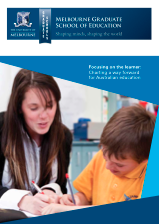EDUCATION WAS, famously, Julia Gillard’s pet policy area. It has enjoyed special attention throughout the Rudd/Gillard years. But with Gillard now gone and a heated election contest underway, it is important education reform does not start slipping down the Government’s priority list.
Gillard’s departure came just before the deadline for States to sign up to the "Gonski" or National Plan for School Improvement changes — rebranded by Kevin Rudd as the ‘Better Schools’ plan. This plan contains much more than proposed school funding reform. It also includes measures designed to lift student outcomes, including school improvement plans and higher entry standards into teaching. It gives the Federal Government unprecedented control over Government schools, which have historically been a State responsibility.
Prime Minister Rudd has confirmed his Government’s commitment to the national plan and extended the deadline for the States to sign up. The new Education Minister, Bill Shorten, now has his work cut out for him. The issue of Federal control has been one of the major sticking points in the Commonwealth’s negotiations with the States and Territories, and may be one of the reasons they have become so political and, in some cases, bitter.
In any case, headlines about education in recent weeks and months have been focussed on politicking, negotiations and speculations about what a Coalition Government may or may not do.
In this climate, we seem to have lost sight of two important points.
Firstly, although funding is important, and Australia’s school funding system is in urgent need of repair, money alone is not a magic bullet. How we spend our resources is just as important. Secondly, the tension between State solutions and Federal solutions to similar problems needs to be resolved. We need to find a way States can learn from one another about which solutions work best and how to negotiate Federal solutions that add an additional layer of complication and, often, bureaucracy.
Headlines about education in recent weeks and months have been focussed on politicking, negotiations and speculations.
The Melbourne Graduate School of Education recently released a policy paper, 'Focusing on the learner: Charting a way forward for Australian education', in an attempt to refocus the debate on what really matters: the needs students and the professional capabilities of teachers. Politicians should take heed.
Research has shown time and again that teaching is by far the most crucial adjustable driver of student outcomes. Matters like school autonomy, school choice and test-based accountability are distractions. These policy proposals and their like tend to be driven by a market-informed agenda that privileges notions of choice, competition, accountability and standardisation in schooling. This agenda, however, has been replicated unsuccessfully by a number of Western countries, none of which are high performers internationally.
 Instead, the MGSE paper argues we need to lift the profession of teaching and increase teachers’ professional capabilities. We have focused too much on the craft of teaching in the past; on the performance of curriculum delivery and classroom management. Our focus has not really been on the learners’ needs: how we know when they ‘get it’, whether they understand a concept from a surface to deep level or how teachers recognise and respond to learner’s misconceptions.
Instead, the MGSE paper argues we need to lift the profession of teaching and increase teachers’ professional capabilities. We have focused too much on the craft of teaching in the past; on the performance of curriculum delivery and classroom management. Our focus has not really been on the learners’ needs: how we know when they ‘get it’, whether they understand a concept from a surface to deep level or how teachers recognise and respond to learner’s misconceptions.
Education systems should produce students who can solve problems they have never seen before and be knowledge producers, managers, and evaluators. We do not want a generation of young people who can replicate what has been previously learned until the cows come home, but are incapable of generating any new knowledge for themselves. In these days of instant access to information, students cannot believe everything they read. Instead they need to know how to cognitively evaluate the quality of information and use it to problem-solve.
The good news is that there are models of classroom practice that enable teachers to determine what each student is ready to learn and instructional strategies that help students develop deep understanding and become problem solvers and knowledge producers. The role of data is vital in these models; teachers must become adept and gathering, interpreting and evaluating data to inform their instruction. They need to accurately diagnose what each student brings to a lesson; know multiple interventions to add value to this prior learning; and know when the students are successful and how to modify interventions to lead to this success. Together, these models are called clinical teaching.
Importantly, this means there is a body of professional practice that is research-informed and will make an impact on how our children learn. The focus for policy makers should be on enabling and empowering the profession to embrace and adopt these practices in the same way that, when medical or engineering research discovers a more effective way of doing things, it is adopted into professional practice.
This means we need to prepare teachers at universities to be what we call ‘clinical practitioners’. We need to offer rigorous professional development in clinical teaching and make sure school leaders have access to the tools to support this practice. What's more, the profession needs to define and own its practice. Our paper outlines steps in all four of these areas.
Although funding is important, and Australia’s school funding system is in urgent need of repair, money alone is not a magic bullet.
An important step is to set clear professional standards for teaching. We currently have a situation where Governments talk about the importance of ‘quality teaching’ on the one hand, but fail to address the falling standards of entry into undergraduate teacher education on the other (average ATARs have been slipping year on year, with some universities accepting applicants with ATARs below 50 this year). This appears to be a double standard, and unfortunately sends the wrong message.
Low entrance standards are not acceptable in other important professions. Why should they be in the teaching? We argue that teaching is no less complex and challenging. We cannot make serious arguments about lifting the profession of teaching in order to lift student outcomes until this double standard is addressed.
As such, it is welcome to hear the new Minister for Higher Education, Senator Kim Carr, raising the possibility of reconsidering the demand-driven undergraduate system and, in particular, its impact on teacher education and engineering.
So while the Better School plan negotiations role on, and media attention undoubtedly refocuses on which-Premier-said-what, let’s not forget who truly matters in our education system: our students and our teachers.





